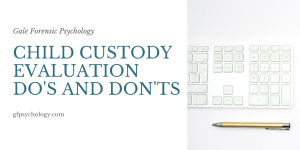Child Custody Evaluations
A child custody evaluations can be a daunting experience, but as parents, it’s vital to maintain a level head and act in the best interest of the child. The whole evaluation process can be intimidating, and the notion of an unfavorable custody agreement is outright scary. This can lead parents to act in ways that may actually undermine their efforts and end up with a worse agreement than if they had played by the rules. To help you get the best custody agreement possible, here are some of the most important do’s and don’ts to keep in mind.
Custody Evaluations Do’s:
- Be honest: By being honest and forthright with your evaluator, you’re showing them that you’re dedicated to reaching the best solution for the child. The child’s welfare is what they care about most, so if they see that you genuinely care, they are more likely to make a positive evaluation. When they ask a question, just tell the truth. Even if you think the truth will make you look bad, it will make you look much better than a lie would.
- Focus on the child’s well-being: Put the child’s happiness and safety above all else. You may have some gripes with the other parent, but the child likely doesn’t feel the exact same way, and the evaluator certainly doesn’t have that bias. When speaking to the evaluator, stay on the subject of the child. It may be tempting to preach your case, but to the court, this isn’t about you, and they owe you no favors.
- Be prompt with any paperwork and requirements: Now is not the time to procrastinate. If they need a document, get it to them ASAP!
- Understand that the other parent has a role in the child’s life: The legal system is geared towards giving each parent as much access to their children as they deem possible, so be sure to understand this as you move through the process.

Custody Evaluations Don’ts:
- Speak poorly of the other parent: While it’s fine to voice your concerns, stay on topic, and mention any problems you may have when appropriate. They don’t want to hear bias.
- Coach the kids: If you coach the kids to answer a certain way, the evaluator will know, and it will not help your case!
- Miss appointments: The evaluator is busy, and they have better things to do than wait for you. Nobody likes having their time wasted, and blowing them off at such a critical time will not reflect well on you.
- Stray from any legal orders or judgments: They want to see that you’re a team player. If you won’t follow the court’s orders, they won’t want to work with you.
No matter how it all turns out, don’t panic if it doesn’t go the way you want it to. This is a trying time, and negativity will only make things worse. You will have a chance to revisit the custody agreement in the future. In the meantime, do what they say. If you show them that you’re willing to follow their orders, it will reflect well on you. At the end of the day, the child is what matters most, and the legal system’s objective is to ensure that the child’s needs are met.
